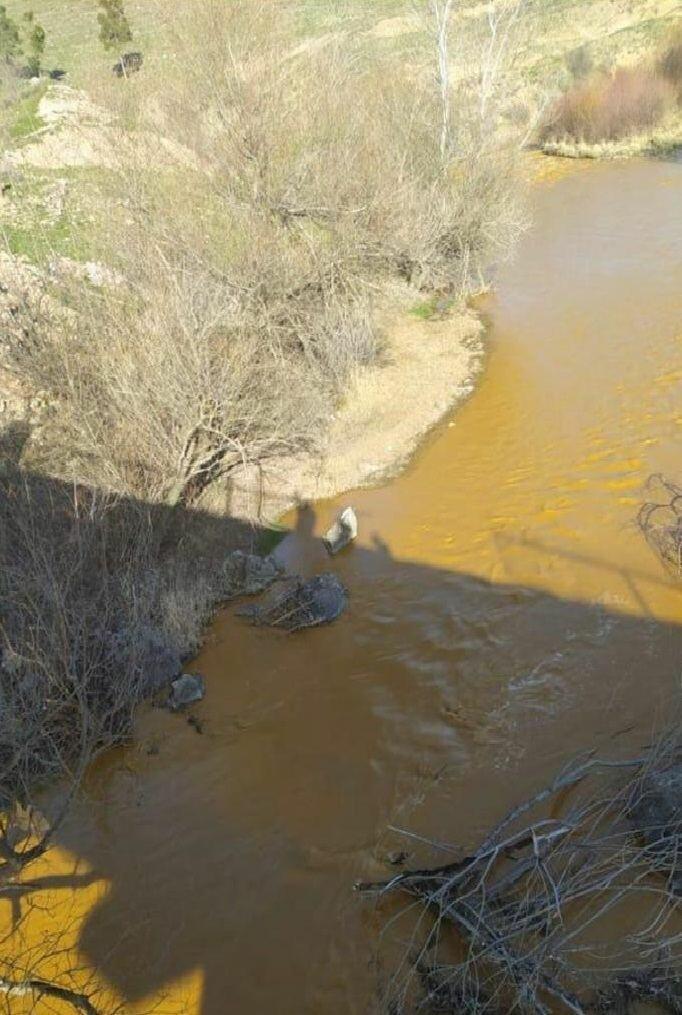Baku urges halt to operation of Armenian plant polluting transborder river

By Vafa Ismayilova
Azerbaijani presidential aide Hikmat Hajiyev has urged responsible companies to stop operating the Zangazur copper-molybdenum plant located in Armenia’s Syunik region due to the environmental catastrophe caused by the latter.
It should be noted that the main shareholder of the plant, which massively pollutes the transboundary Okhchuchay River, is Germany’s Cronimet Mining company.
"Water has been called ‘mining’s most common casualty’. The Okhchu [Okhchuchay] river which flows from Armenia to Azerbaijan is unfolding an environmental catastrophe. Heavy chemical contamination as a result of Armenia's mining industry. Responsible companies must stop their activities," Hajiyev wrote on his official Twitter account.
Meanwhile, a few Azerbaijani organizations have turned to international agencies, urging a response to this ecological disaster.
The Union of Student Youth Organizations of Azerbaijan, the largest student organization in the South Caucasus, issued a statement over Armenia's pollution of the Okhchuchay River.
The document, referring to the Ecology and Natural Resources Ministry monitorings carried out on the river, emphasizes that the high content of heavy metals and severe water pollution pose a threat to biological resources, the ecosystem of the Araz and Kur Rivers, the Caspian Sea, and the local population.
It added that Armenia hasn’t signed and isn’t fulfilling the Helsinki Convention on the Protection and Use of Transboundary Watercourses and International Lakes.
They called on international organizations to take a more decisive position on this issue and stop the irresponsible actions of Armenia.
The National Assembly of Youth Organizations of Azerbaijan made a similar appeal to international organizations regarding Okhchuchay's pollution.
The youth organizations of Azerbaijan informed the international community about the constant pollution of the river by Armenia and the fact that its pollution directly threatens the quality of water resources used by Azerbaijan’s population.
Also, the river’s pollution poses a serious threat to biodiversity, the environment, and human health, the appeal said.
The appeal reads that the Armenian government is responsible for what is happening in the context of environmental security in the region.
The authors of the appeal called on international organizations to express a decisive position so that Armenia does not pollute the environment with harmful waste, stop endangering nature, as well as the health and safety of the population, in particular the younger generation.
The appeal stressed that this is the only way to ensure the strengthening of confidence, environmental security and the establishment of lasting peace in the region.
Meanwhile, the chairperson of the Azerbaijani-Turkish youth organization, liaison officer of Scandinavian Azerbaijanis’ Coordination Council in Finland, Ulviya Jabbarova, said that the Azerbaijani community living in Finland is very concerned about the ecological disaster on the Okhchuchay River.
Jabbarova made the remarks in an address to international organizations, commenting on Armenia's pollution of the river running through Azerbaijan’s Zangilan region and flowing into the Araz River.
"As a Finnish woman of Azerbaijani origin, I ask you for help. This is about the German Cronimet company. This company must take measures to protect the environment and put an end to environmental crimes," she said.
The organization’s representative stressed that Armenia dumps industrial waste from the Zangzur copper and molybdenum plant, the majority of the shares of which belongs to Cronimet company, into the river without preliminary treatment, adding that Armenia has recognized the existence of this problem.
"Since the point is about our planet, which is home for each of us, and about the health of future generations, the international community and organizations must immediately intervene and take decisive measures," Jabbarova emphasized.
Armenia’s three-decade occupation of Azerbaijani territories extensively damaged the ecosystem, wildlife and natural resources in and around the Nagorno-Karabakh region. Armenians also resorted to large-scale acts of ecological terror in regions they had to leave under the trilateral November peace deal that stipulated the return of Azerbaijan’s occupied territories.
The clashes between Armenia and Azerbaijan escalated for the second time in 2020 after Armenia's forces deployed in the occupied Azerbaijani lands targeted Azerbaijani civilian settlements and military positions, causing casualties among civilians and the military. In the early hours of September 27, Azerbaijan launched a counter-offensive operation that lasted six weeks. The operation resulted in the liberation of Azerbaijan's occupied lands.
A Russia-brokered ceasefire deal that Azerbaijan and Armenia signed on November 10, 2020, brought an end to the 44-day war between the two countries. The Azerbaijani army declared a victory against the Armenian troops. The signed agreement obliged Armenia to withdraw its troops from the Azerbaijani lands that it had occupied.
--
Follow us on Twitter @AzerNewsAz
Here we are to serve you with news right now. It does not cost much, but worth your attention.
Choose to support open, independent, quality journalism and subscribe on a monthly basis.
By subscribing to our online newspaper, you can have full digital access to all news, analysis, and much more.
You can also follow AzerNEWS on Twitter @AzerNewsAz or Facebook @AzerNewsNewspaper
Thank you!
